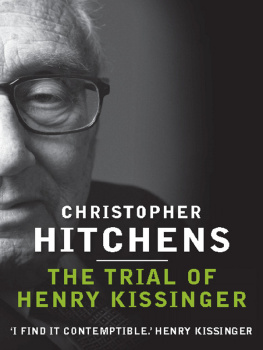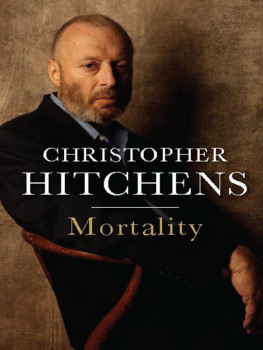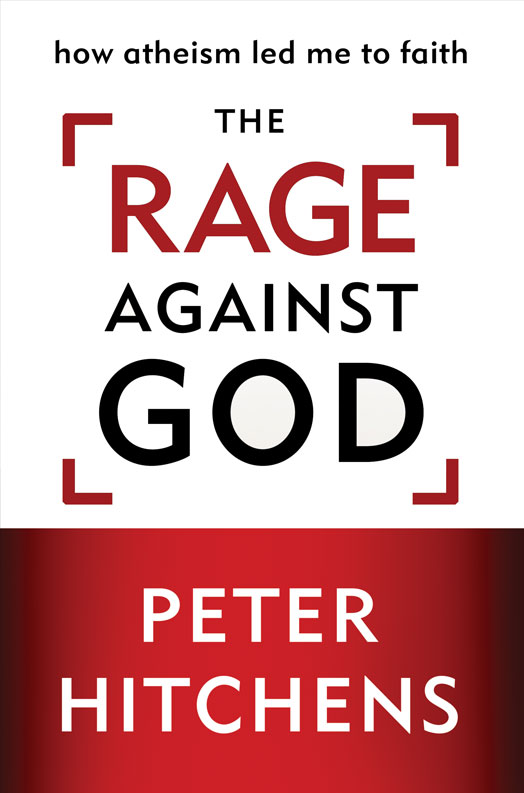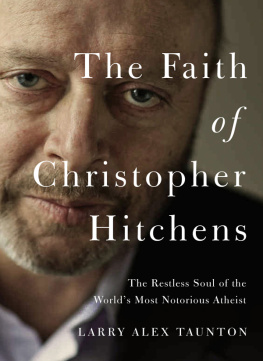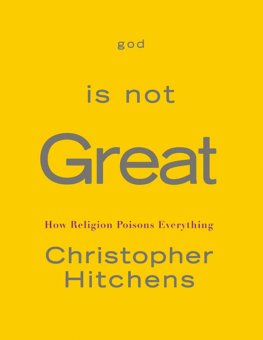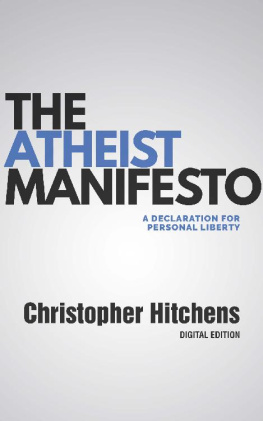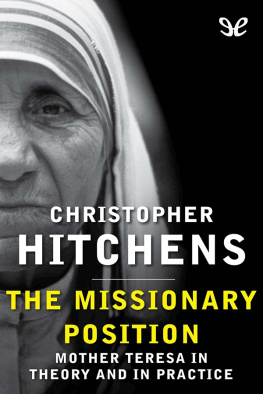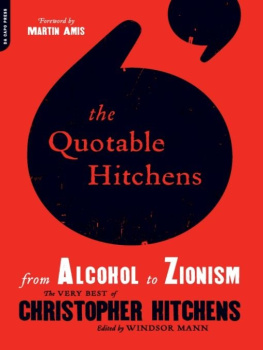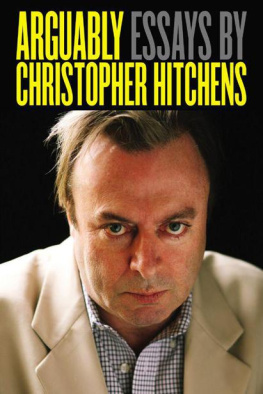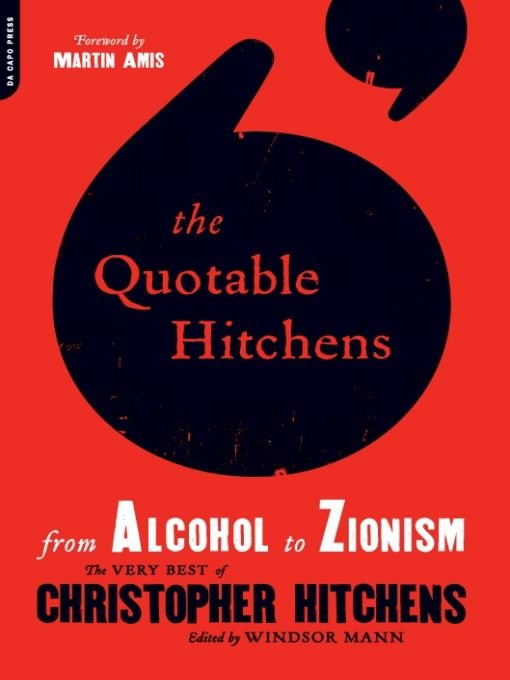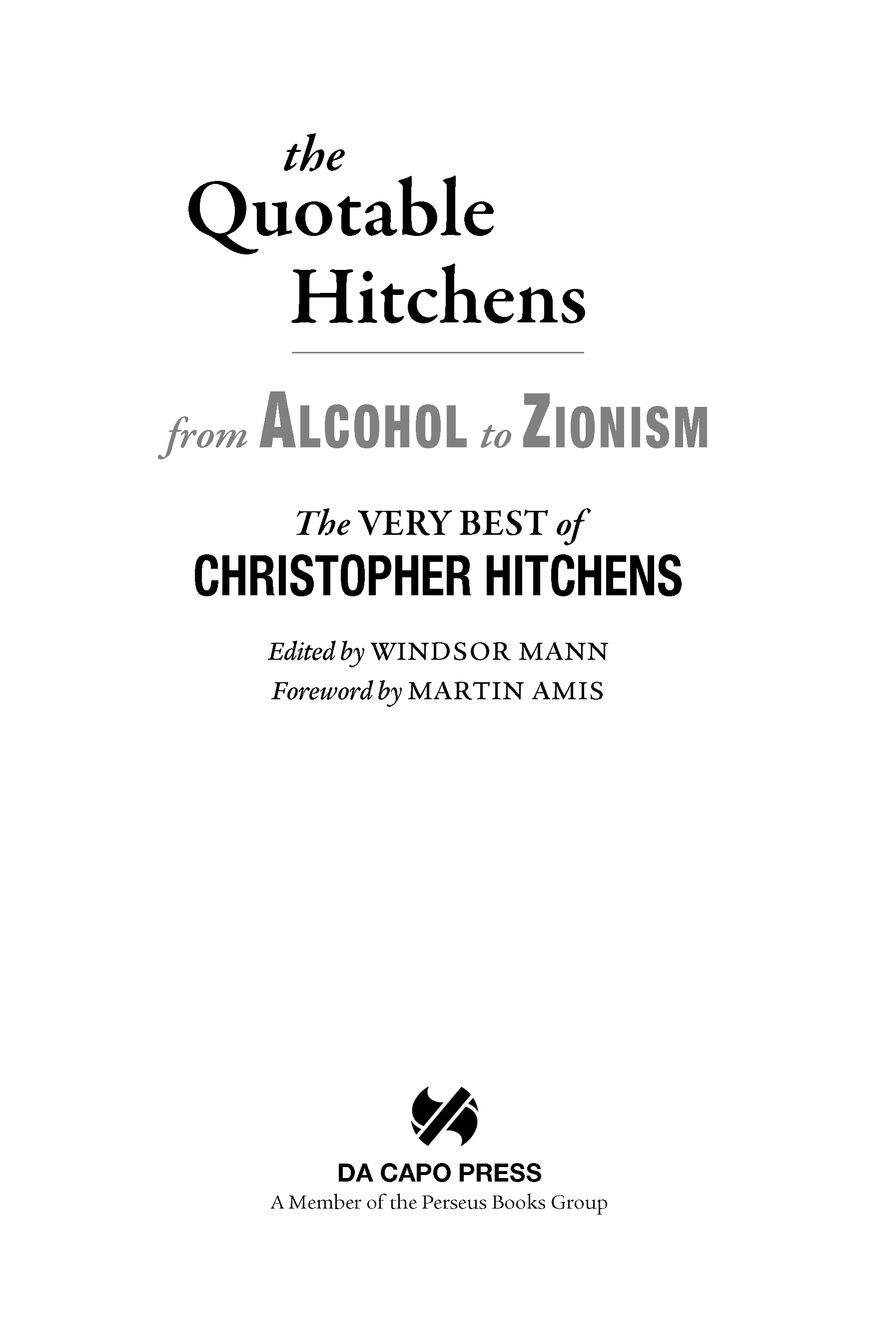Table of Contents
ALSO BY CHRISTOPHER HITCHENS
Books
Hostage to History: Cyprus from the Ottomans to Kissinger
Blood, Class and Nostalgia: Anglo-American Ironies
Imperial Spoils: The Curious Case of the Elgin Marbles
Why Orwell Matters
No One Left to Lie To: The Triangulations of William Jefferson Clinton
Letters to a Young Contrarian
The Trial of Henry Kissinger
Thomas Jefferson: Author of America
Thomas Paines Rights of Man: A Biography
God Is Not Great: How Religion Poisons Everything
Hitch-22: A Memoir
Pamphlets
Karl Marx and the Paris Commune
The Monarchy: A Critique of Britains Favorite Fetish
The Missionary Position: Mother Teresa in Theory and Practice
A Long Short War: The Postponed Liberation of Iraq
Collected Essays
Prepared for the Worst: Essays and Minority Reports
For the Sake of Argument
Unacknowledged Legislation: Writers in the Public Sphere
Love, Poverty and War: Journeys and Essays
Collaborations
James Callaghan: The Road to Number Ten (with Peter Kellner)
Blaming the Victims (edited with Edward Said)
When the Borders Bleed: The Struggle of the Kurds (photographs by Ed Kashi)
International Territory: The United Nations (photographs by Adam Bartos)
Vanity Fairs Hollywood (with Graydon Carter and David Friend)
Editor
The Portable Atheist: Essential Readings for the Non-Believer
For Professor Hitchens
Foreword
by MARTIN AMIS
Spontaneous eloquence seems to me a miracle, confessed Vladimir Nabokov in 1962. He took up the point more personally in his foreword to
Strong Opinions (1973):
... I have never delivered to my audience one scrap of information not prepared in typescript beforehand.... My hemmings and hawings on the telephone cause long-distance callers to switch from their native English to pathetic French.
At parties, if I attempt to entertain people with a good story, I have to go back to every other sentence for oral erasures and inserts.... [N]obody should ask me to submit to an interview.... It has been tried at least twice in the old days, and once a recording machine was present, and when the tape was rerun and I had finished laughing, I knew that never in my life would I repeat that sort of performance.
We sympathize. And most literary types, probably, would hope for inclusion somewhere or other on Nabokovs sliding scale: I think like a genius, I write like a distinguished author, and I speak like a child.
Mr. Hitchens isnt like that. Christopher and His Kind runs the title of one of Isherwoods famous memoirs. And yet this Christopher doesnt have a kind. Everyone is uniquebut Christopher is preternatural. And it may even be that he exactly inverts the Nabokovian paradigm. He thinks like a child (that is to say, his judgments are far more instinctive and moral-visceral than they seem, and are animated by a childs eager apprehension of what feels just and true); he writes like a distinguished author; and he speaks like a genius.
As a result, Christopher is one of the most terrifying rhetoricians that the world has yet seen. Lenin used to boast that his objective, in debate, was not rebuttal and then refutation: it was the destruction of his interlocutor. This isnt Christophers policybut it is his practice. Toward the very end of the last century, all our greatest chess players, including Gary Kasparov, began to succumb to a computer (named Deep Blue); I had the opportunity to ask two grandmasters to describe the Deep Blue experience, and they both said, Its like a wall coming at you. In argument, Christopher is that wall. The prototype of Deep Blue was known as Deep Thought. And theres a case for calling Christopher Deep Speech. With his vast array of geohistorical references and precedents, he is almost googlelike; but google (with, say, its ten million results in 0.7 seconds) is something of an idiot savant, and Christophers search engine is much more finely tuned. In debate, no matter what the motion, I would back him against Cicero, against Demosthenes.
Whereas mere Earthlings get by with a mess of expletives, subordinate clauses, and finely turned tautologies, Christopher talks not only in complete sentences but also in complete paragraphs. Similarly, although he mentions the phenomenon in these pages, he is an utter stranger to what Diderot called lesprit de lescalier: the spirit of the staircase. This phrase is sometimes translated as staircase witfar too limitingly, in my view, because lesprit de lescalier describes an entire stratum of ones intellectual and emotional being. The door to the debating hall, or to the contentious drinks party, or indeed to the little flat containing the focus of amatory desire, has just been firmly closed; and now the belated eureka shapes itself on your lips. These lost chances, these unexercised potencies of persuasion, can haunt you for a lifetimeparticularly, of course, when the staircase was the one that might have led to the bedroom.
As a young man, Christopher was conspicuously unpredatory in the sexual sphere (while also being conspicuously pan-affectionate: Ill just make a brief pass at everyone, he would typically and truthfully promise a mixed gathering of fourteen or fifteen people, and then Ill be on my way). I cant say how it went, earlier on, with the boys; with the girls, though, Christopher was the one who needed to be persuaded. And I do know that in this area, if in absolutely no other, he was sometimes inveigled into submission.
The habit of saying the right thing at the right time tends to get relegated to the category of the pert riposte. But the put-down, the swift comeback, when quoted, gives a false sense of finality. So-and-so, as quick as a flash, said so-and-soand that seems to be the end of it. Christophers most memorable rejoinders, I have found, linger, and reverberate, and eventually combine, as chess moves combine.... One evening, close to forty years ago, I said, I know you despise all sportsbut how about a game of chess? Looking mildly puzzled and amused, he joined me over the sixty-four squares. Two things soon emerged. First, he showed no combative will, he offered no resistance (because this was play, you see, and earnest is all that really matters). Second, he showed an endearing disregard for common sense. This prompts a paradoxical thought.
There are many excellent commentators, in the United States and the United Kingdom, who deploy far more rudimentary gumption than Christopher ever bothers with (we have a deservedly knighted columnist in London whom I always think of, with admiration, as Sir Common Sense). But it is hard to love common sense. And the salient fact about Christopher is that he is loved. What we love is fertile instability; what we love is the agitation of the unexpected. And Christopher always comes, as they say, from left field. He is not a plain speaker. He is not, I repeat, a plain man.
Over the years Christopher has spontaneously delivered many dozens of unforgettable lines. Here are four of them.


